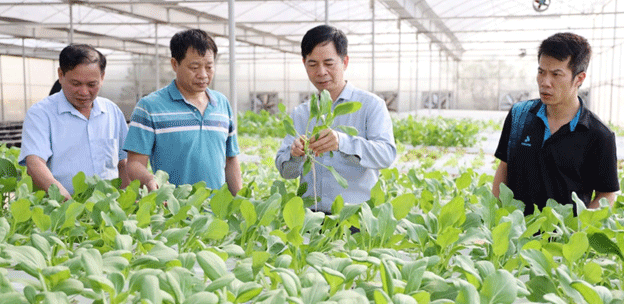The agriculture industry is rapidly evolving, and high-tech solutions are now integral to ensuring sustainable and efficient food production. In Sơn La Province, a pilot project using hydroponic technology and soilless cultivation is paving the way for a new era in agricultural practices. On April 22, 2024, the People’s Committee of Sơn La Province signed a cooperation agreement with the Institute of Vegetable and Fruit Research (under the Ministry of Agriculture and Rural Development) to implement a high-tech hydroponic model aimed at producing safe, high-quality fruits and vegetables.
The project, established in the Mộc Châu Research and Application Center for Agricultural Technology Innovation, utilizes nearly 2,000 square meters of greenhouse space to test the soilless cultivation of crops such as melons, tomatoes, and lettuce. This approach involves growing crops in coconut fiber substrates combined with a hydroponic system. Nutrient-rich water is circulated through the substrate, supporting plant growth. The recirculated water is treated with UV light to eliminate harmful bacteria, fungi, and viruses before being reused.
Nguyễn Anh Dũng, Deputy Director of the Innovation Startup Support Center, highlighted that the pilot project’s success is crucial in addressing soilborne diseases—particularly bacterial and fungal infections that can be difficult to manage without specific treatments. Hydroponics, using coconut fiber substrates, offers a solution to this problem by eliminating the soil as a vector for disease, reducing the risk of crop failure and production losses.
The preliminary results of the project are promising. After 75 days of growing melons in the soilless system, the plants were ready for harvest, producing fruits weighing between 1.8 to 2 kg each, with a high level of sweetness and fragrance. Tomatoes and lettuce have also shown significant growth improvements, with yields increasing by 1.5 times compared to traditional soil-based cultivation. Additionally, the growing cycle was reduced by 7-10 days per crop, increasing overall productivity. For example, farmers can expect an income of VND 100-120 million from 1,000 square meters of greenhouse tomato cultivation over 4-6 months, while melon production generates VND 120-150 million in just 2.5-3 months.
Hydroponics is not entirely new to Vietnam, with regions such as Lâm Đồng and Ho Chi Minh City already employing this technology. However, most farmers in Mộc Châu continue to rely on conventional soil-based farming. By demonstrating the benefits of soilless systems, this pilot program introduces local farmers to modern agricultural techniques that improve crop yield, reduce water usage, and cut back on pesticide and fertilizer inputs.
The project also includes training sessions for farmers, conducted in collaboration with the Food and Agriculture Organization (FAO). These workshops educate farmers on the technical aspects of hydroponic farming, ensuring they can apply these innovations to their operations. Nguyễn Văn Duyến, a farmer from Chiềng Hắc Commune, shared his experience participating in the “Smart Agriculture for Future Generations” project. After upgrading his greenhouse and applying the new technology to his tomato crops, he saw an increase in yield to 21 tons per season. Duyến noted that the soilless method has numerous advantages, such as reduced disease pressure, water conservation, and improved overall crop quality.
The project is expected to run through May 2025. Once completed, the Institute of Vegetable and Fruit Research will transfer the entire hydroponic infrastructure to the Innovation Startup Support Center for ongoing management and expansion. Lưu Bình Khiêm, Director of the Sơn La Department of Science and Technology, emphasized the positive impact of the project. Following its success, the department plans to expand the soilless farming model to local businesses, cooperatives, and individual farmers who are interested in adopting these advanced techniques.
The potential for hydroponic farming to revolutionize agriculture in Sơn La and beyond is clear. As consumer demand for high-quality, locally grown produce continues to rise, so too does the need for farmers to adopt innovative methods that increase productivity while preserving environmental resources. The pilot program in Mộc Châu represents a significant step toward meeting these demands, positioning the province at the forefront of high-tech agricultural development.
The pilot hydroponic project in Mộc Châu demonstrates the tangible benefits of integrating high-tech farming solutions into local agricultural practices. By increasing yields, improving crop quality, and reducing environmental impact, this model offers a sustainable path forward for farmers in Sơn La and other regions. As more farmers embrace these advancements, the future of agriculture in Vietnam is set to be more efficient, resilient, and environmentally conscious.












